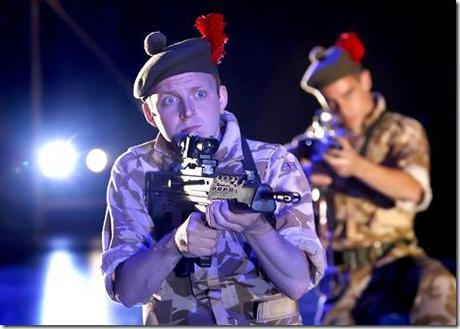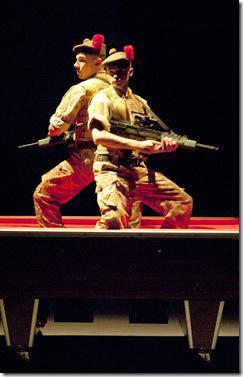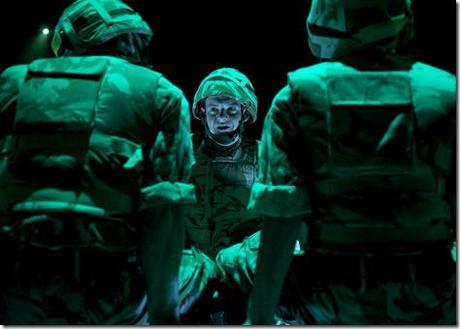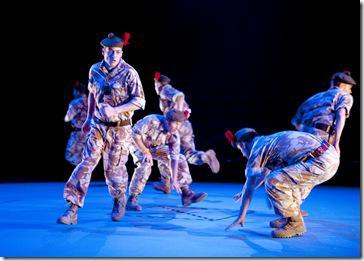An ode to bravery, camaraderie, and unquestioning loyalty to your mates

National Theatre of Scotland i/a/w Chicago Shakespeare presents
Black Watch
Review by Catey Sullivan
Cry havoc, and let slip the dogs of testosterone. Such is the pile-driving force of machismo that fuels the National Theatre of Scotland’s Black Watch. When it comes to sheer male fury, there’s nary an ensemble in town more committed to portraying the good, the bad and the heroic of contemporary warriors of XY chromosomal construction.

At the onset, the men are waiting for a female reporter to show up – a woman they’ve agreed to speak with only because they hope she might be willing to give blowjobs to her subjects. Their language speaks to an all-boys club dominated by a locker room mentality. Burke takes much of the dialogue straight from interviews with members of the Black Watch; the result is that the words are steeped in undeniable authenticity and uncensored ugliness. About that uncensored ugliness: It feels like every other word being uttered in Black Watch is either “cunt” or “fuck.” While I’ve got absolutely no problem with the deployment of so-called obscenities into the realms of theater (or in real life for that matter), the sheer repetition of these powerful terms renders them impotent here.
There’s no reason to doubt that this is the vernacular Burke worked with when shaping interviews into a play. But the misogynistic language gets tiresome quickly. After about the 20th f bomb, Black Watch starts to feel more grating than expressive. There’s only so much you can convey via four-letter words – use them too often and you’ve got tedium rather than drama . The muddy acoustics of the Armory doesn’t do the heavily accented show any favors either. The thick Scottish brogues may be accurate, but they are also often intelligible.
Still, the most impressive aspect of Black Watch comes not from words but from movement. In many respects, watching Black Watch is akin to watching a ballet, albeit a ballet where the dancers are ruthlessly jacked up on steroids and living in perpetual, adrenaline-crazed flight-or-flight response. All that adrenaline electrifies the scenes of hand-to-hand combat, moments of breathtaking violence and choreographed grace. The most shockingly graceful scene of violence comes toward the end, as a trio of badly injured soldiers are sent airborne, tumbling through space with a slo-mo beauty that seems utterly incongruous with their gaping, bleeding wounds.
Also memorably impactful: A fast-moving physical aria in which the entire history of the legendary regiment plays out in a series of on-stage costume changes perfectly synchronized with rapid-fire verbal volleys of military lore.
Where Black Watch truly taps into its often galvanic power is in the final scene, when the men perform a series of maneuvers to the rhythms of Scottish music. It’s a scene to stir the viscera, richly moving portrayal of bravery, camaraderie, and unquestioning loyalty to the mates around you.
Rating: ★★★
Black Watch continues through October 21st at the Broadway Armory, 5917 N. Broadway (map), with performances Tuesday thru Saturday at 8pm, Sundays 3pm. Tickets are $38-$52, and are available by phone (312.595.5600) or online here (check for half-price tickets at Goldstar.com). More information at ChicagoShakes.com. (Running time: 1 hour 50 minutes, no intermission)

artists
cast
Cameron Barnes (Macca); Ryan Fletcher (Cammy); Scott Fletcher (Kenzie); Andrew Fraser (Fraz); Robert Jack (Writer, Sergeant); Stephen McCole (Officer, Lord Elgin); Adam McNamara (Rossco); Richard Rankin (Granty); Chris Starkie (Stewarty); Gavin Jon Wright (Nabsy); Finlay Bain, John Winchester (understudies)
behind the scenes
John Tiffany (director); Steven Hoggett (asst. director, movement); Davey Anderson (asst. director, music); Laura Hopkins (scenic design); Colin Grenfell (lighting); Gareth Fry (sound design); Jessica Brettle (costumes); Leo Warner, Mark Grimmer, 59LTD (video design); Calyn P. Swain (stage manager); Manuel Harlan, Colin Mearns, Pavel Antonov, Scott Suchman (photos)


